Nearly all transgender people experience gender dysphoria (a disconnect between the gender one identifies with and their body's) in their lives, but for transgender women, that dysphoria is compounded by the sexism inherent in American society, and the way it treats women’s bodies. We cannot use public restrooms without garnering backlash, and many trans women are often shamed by society for diverging from already-high expectations for women’s bodies, from our height to our voices to what’s in our pants.As a trans woman, I’ve contended with cissexism (sexism against transgender people) amplified by transmisogynoir, the oppression of trans black women, who are subject to some of the heaviest forms of discrimination and violence in our country. And for trans women of all stripes, the compounded nature of sexism and anti-trans discrimination in American society makeds transitioning difficult, to say the least.But if the narrative surrounding our community is one of constant negativity and despair, we’ll never be allowed to thrive. Many trans women find some refuge against body and gender dysphoria through transition; things like changing the way we wear our hair or specific changes in our bodies can become a beacon of hope. I interviewed five trans women about the parts of their transition they love, those that have helped them see themselves for the women they really are.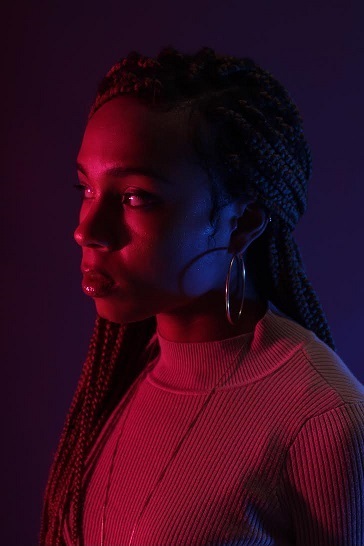 When I feel really dysphoric, I hold up a mirror to my face. I look and search for femininity. I look at my face and see women in my family, which makes me realize the legacy of strong black women I'm part of. I look at my lips and see my mother. I look at my eyes and see my grandmother. I look at my nose and see my great-grandmother. Finding femininity in my natural features diminishes my dysphoria and makes me feel a strong sense of pride.Growing up, I was always told I looked like different men in my family. I fought back by likening myself to our family’s women—and I did this without even realizing how much more my experiences resonated with womanhood. Once, when I was nine, I remember my mother finding an old photo of herself at that same age; my cousins saw it and said, “Wow, you look just like her but with a wig on.” It’s a memory I’ve held onto, and when puberty hit, I relished in it. I watched as my jawline became more square and defined; my hands and feet began to grow, but the rest of my body didn't keep up. Many people said they were disportionate to the rest of my body. It’s something I’ve struggled with.A couple years ago, I began working out and pushing my body past its limits. I did this to run away from transitioning and hopefully finally bring my body into proportion. I've since worked to lose that muscle mass, but now I see that young kid in high school I once was—with too-large hands and feet and a body too small and skinny to match. But my face hasn’t betrayed me too much throughout all these years. It's the one thing I don't feel as compelled to change quite as much or wish that I could.I definitely compare myself to cis women way too much, which only leads to my pointing out facial features that don't match "traditional" standards of beauty. But when I think of the women in my family before me, I reclaim my own personal narrative, and position myself in the narrative of womanhood that trans women are so often denied. We have to reclaim our time.
When I feel really dysphoric, I hold up a mirror to my face. I look and search for femininity. I look at my face and see women in my family, which makes me realize the legacy of strong black women I'm part of. I look at my lips and see my mother. I look at my eyes and see my grandmother. I look at my nose and see my great-grandmother. Finding femininity in my natural features diminishes my dysphoria and makes me feel a strong sense of pride.Growing up, I was always told I looked like different men in my family. I fought back by likening myself to our family’s women—and I did this without even realizing how much more my experiences resonated with womanhood. Once, when I was nine, I remember my mother finding an old photo of herself at that same age; my cousins saw it and said, “Wow, you look just like her but with a wig on.” It’s a memory I’ve held onto, and when puberty hit, I relished in it. I watched as my jawline became more square and defined; my hands and feet began to grow, but the rest of my body didn't keep up. Many people said they were disportionate to the rest of my body. It’s something I’ve struggled with.A couple years ago, I began working out and pushing my body past its limits. I did this to run away from transitioning and hopefully finally bring my body into proportion. I've since worked to lose that muscle mass, but now I see that young kid in high school I once was—with too-large hands and feet and a body too small and skinny to match. But my face hasn’t betrayed me too much throughout all these years. It's the one thing I don't feel as compelled to change quite as much or wish that I could.I definitely compare myself to cis women way too much, which only leads to my pointing out facial features that don't match "traditional" standards of beauty. But when I think of the women in my family before me, I reclaim my own personal narrative, and position myself in the narrative of womanhood that trans women are so often denied. We have to reclaim our time.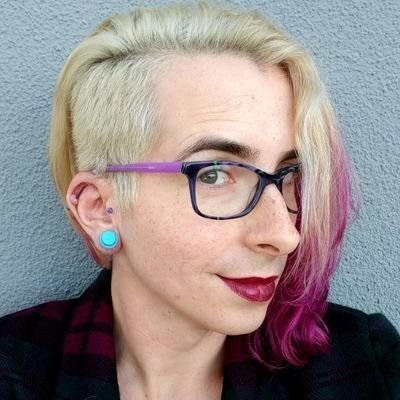 As cliché (for a trans girl) as it may sound, nothing makes me feel happier about my body than my breasts: how they feel on my frame, or nestled against my arms as I fall asleep; how they look in a bra, in a dress, or in someone else's hands; having a bosom to cradle the faces of the people I care about, to raise the eyebrows of my lovers, to demand attention. They make me feel powerful, confident, and most of all, myself, a part of my body I've never had before yet somehow feel joyfully reunited with.The development of my breasts has been a constant throughout my medical transition, and always a source of high emotion. As my flat pecs first starting aching with a tell-tale breast bud, the fearful thrill it sent through my body confirmed that I did, in fact, want to walk down this path. And then they slowly emerged, small and tender, needing to be hidden under scarves and sweaters. I would check them ten times a day, the way a child might keep returning to the mailbox knowing the toy they ordered is nowhere near yet due to arrive.As they've grown, changing the shape of my body in small but noticeable ways every few months, they've been a constant encouragement for me to evolve my sense of fashion, find new ways to show them off, attempt outfits I'd been too nervous or dysphoric to try before.Two years since I first began taking estrogen, my social transition complete, I still check them every morning before I shower, cupping my hand under modest B-cups and using the gaps between my fingers as lines on a ruler to detect another spurt of growth, knowing I'm only a few years into a strange second puberty stuffed into my adulthood. And even as I go about my days more quietly now, my transition now a practiced part of my life, I’m reminded that even the ability to glance nonchalantly in a mirror, seeing only myself without falling into a vortex of wishing and hoping, is a gift I've only recently learned to give myself.
As cliché (for a trans girl) as it may sound, nothing makes me feel happier about my body than my breasts: how they feel on my frame, or nestled against my arms as I fall asleep; how they look in a bra, in a dress, or in someone else's hands; having a bosom to cradle the faces of the people I care about, to raise the eyebrows of my lovers, to demand attention. They make me feel powerful, confident, and most of all, myself, a part of my body I've never had before yet somehow feel joyfully reunited with.The development of my breasts has been a constant throughout my medical transition, and always a source of high emotion. As my flat pecs first starting aching with a tell-tale breast bud, the fearful thrill it sent through my body confirmed that I did, in fact, want to walk down this path. And then they slowly emerged, small and tender, needing to be hidden under scarves and sweaters. I would check them ten times a day, the way a child might keep returning to the mailbox knowing the toy they ordered is nowhere near yet due to arrive.As they've grown, changing the shape of my body in small but noticeable ways every few months, they've been a constant encouragement for me to evolve my sense of fashion, find new ways to show them off, attempt outfits I'd been too nervous or dysphoric to try before.Two years since I first began taking estrogen, my social transition complete, I still check them every morning before I shower, cupping my hand under modest B-cups and using the gaps between my fingers as lines on a ruler to detect another spurt of growth, knowing I'm only a few years into a strange second puberty stuffed into my adulthood. And even as I go about my days more quietly now, my transition now a practiced part of my life, I’m reminded that even the ability to glance nonchalantly in a mirror, seeing only myself without falling into a vortex of wishing and hoping, is a gift I've only recently learned to give myself.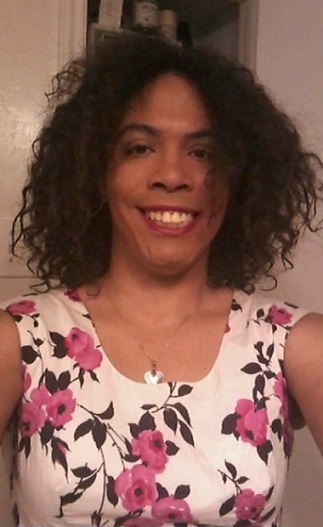 Because I served on active duty in the Marines (something I did partially due to my dysphoria), the fact that I’m able to grow my hair out causes me the least amount of dysphoria. I'm able to do whatever I want with my hair now. And it's brought out comparisons to Angela Davis—comparisons that are nothing short of awesome for me, because I'm an activist.
My favorite part of my transition is my activism. Although there are times I feel it shouldn’t be necessary to have to work this hard, I would rather be driven to step out and represent my community than sit back and not do anything. All of the connections I have made both locally and nationally not only give me a community to talk with but also a family that I can reach out to as well.
Because I served on active duty in the Marines (something I did partially due to my dysphoria), the fact that I’m able to grow my hair out causes me the least amount of dysphoria. I'm able to do whatever I want with my hair now. And it's brought out comparisons to Angela Davis—comparisons that are nothing short of awesome for me, because I'm an activist.
My favorite part of my transition is my activism. Although there are times I feel it shouldn’t be necessary to have to work this hard, I would rather be driven to step out and represent my community than sit back and not do anything. All of the connections I have made both locally and nationally not only give me a community to talk with but also a family that I can reach out to as well.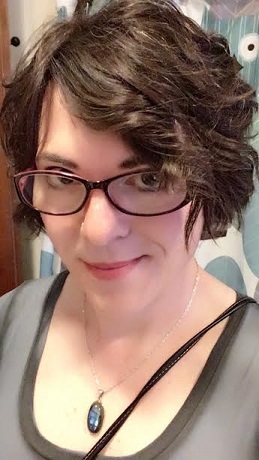 The hair on my head has never been a source of dysphoria for me. It’s always been dark, thick and had a nice natural wave. I can style it as I like. That's nice. And my feet, oddly. They were a men’s 10 when I started; they’re a women’s 9 ½ now.One thing that hormones have fixed and gives me the slightest bit of hope are my eyes. They used to be sunken, sleepy, half-opened slits, and by the magic of taking a few blue and white pills every day, they’re bigger and more feminine than they used to be. They’ve also changed color, from a deep, deep brown to a lighter greenish-brown. What this adds up to is that I look my most feminine in the reflection of my car's rearview mirror. I've also done a bit of voice training, and have eradicated the trigger of my deep voice.
The hair on my head has never been a source of dysphoria for me. It’s always been dark, thick and had a nice natural wave. I can style it as I like. That's nice. And my feet, oddly. They were a men’s 10 when I started; they’re a women’s 9 ½ now.One thing that hormones have fixed and gives me the slightest bit of hope are my eyes. They used to be sunken, sleepy, half-opened slits, and by the magic of taking a few blue and white pills every day, they’re bigger and more feminine than they used to be. They’ve also changed color, from a deep, deep brown to a lighter greenish-brown. What this adds up to is that I look my most feminine in the reflection of my car's rearview mirror. I've also done a bit of voice training, and have eradicated the trigger of my deep voice.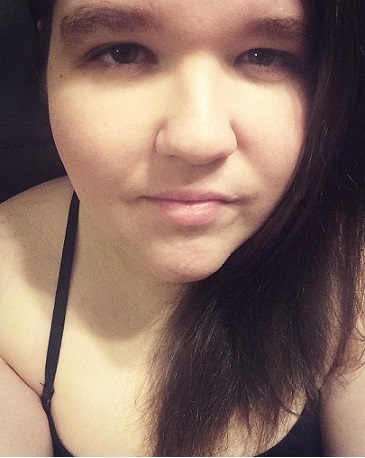 Jenna. That’s my name. It’s the final destination in a long string of names I’ve gone by throughout my life. I always knew the name I was given at birth wasn’t right for me, so I used my initials, went by nicknames, picked entirely new names out for myself on multiple occasions, once even changed it legally. Despite all the different names I went by, nothing ever stuck, until I realized why: I’m transgender. That brought the previous 25 years into perspective. The life I lived—including the countless names I went by—never felt right because it lacked the femininity I desired deep down. Accepting this fact gave me the freedom to find what I needed, and finding a name that accurately describes me, that portrays what I need it to portray, has easily been the best part of my transition. I will never not be astonished at the joy my name has brought me.
Hormone replacement therapy (HRT) has also played a tremendous role in bringing me joy. HRT has brought on countless changes, but for me, the best by far has been breast development. I’ve always been overweight and, thus, my chest has never been flat, but having a flabby chest due to being overweight is absolutely nothing like having breasts. My chest prior to starting HRT caused me so much dysphoria. It looked and felt nothing like it should. Now, though? I love my chest. The tissue growth, the fat redistribution, the roundness, the feeling that I didn’t have before. My boobs are great—and that’s a direct quote from someone else. They’re beautiful, sensual, everything I’ve always wanted. Femininity that, again, I so desperately desired has finally appeared, and a part of my body that used to cause me so much dysphoria has now become my favorite part. I couldn’t ask for more than that.Follow Serena Sonoma on Twitter.
Jenna. That’s my name. It’s the final destination in a long string of names I’ve gone by throughout my life. I always knew the name I was given at birth wasn’t right for me, so I used my initials, went by nicknames, picked entirely new names out for myself on multiple occasions, once even changed it legally. Despite all the different names I went by, nothing ever stuck, until I realized why: I’m transgender. That brought the previous 25 years into perspective. The life I lived—including the countless names I went by—never felt right because it lacked the femininity I desired deep down. Accepting this fact gave me the freedom to find what I needed, and finding a name that accurately describes me, that portrays what I need it to portray, has easily been the best part of my transition. I will never not be astonished at the joy my name has brought me.
Hormone replacement therapy (HRT) has also played a tremendous role in bringing me joy. HRT has brought on countless changes, but for me, the best by far has been breast development. I’ve always been overweight and, thus, my chest has never been flat, but having a flabby chest due to being overweight is absolutely nothing like having breasts. My chest prior to starting HRT caused me so much dysphoria. It looked and felt nothing like it should. Now, though? I love my chest. The tissue growth, the fat redistribution, the roundness, the feeling that I didn’t have before. My boobs are great—and that’s a direct quote from someone else. They’re beautiful, sensual, everything I’ve always wanted. Femininity that, again, I so desperately desired has finally appeared, and a part of my body that used to cause me so much dysphoria has now become my favorite part. I couldn’t ask for more than that.Follow Serena Sonoma on Twitter.
Advertisement

Eva Thomas, Missouri
Advertisement

Ada Powers, California
Advertisement

Nicole Lynn Perry, Washington

Advertisement
Jady Morelli, Michigan

